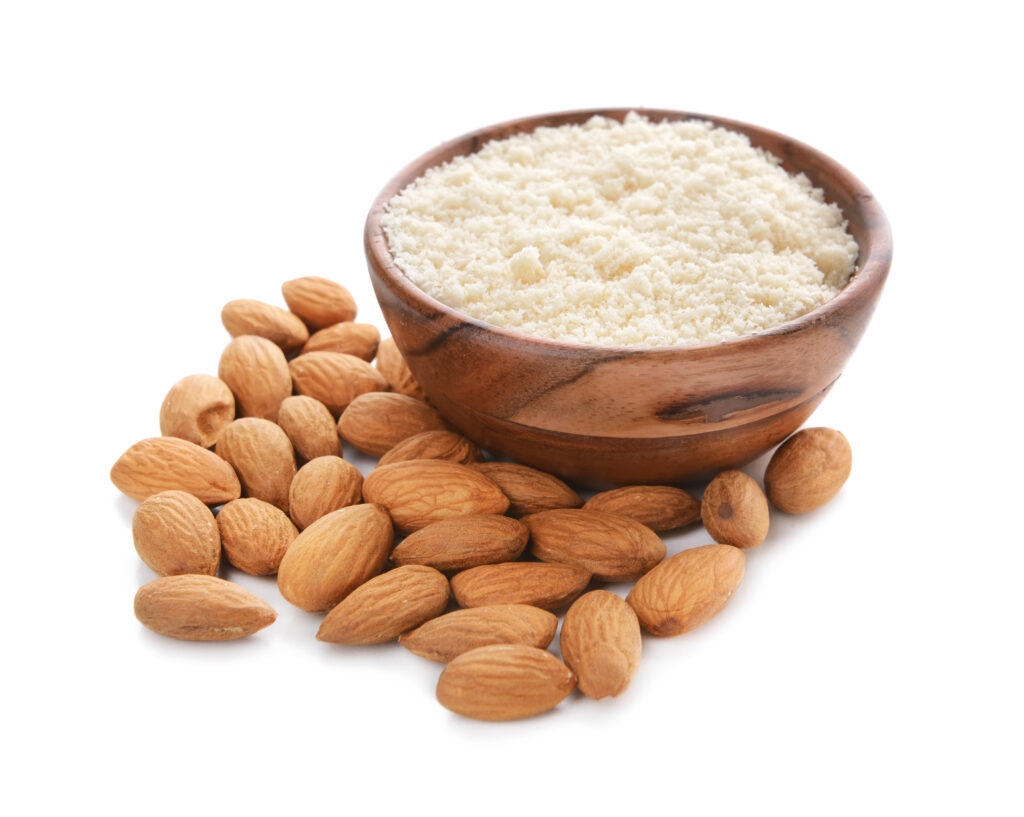White or wheat flour is not always an option for everyone so you can substitute almond flour for all-purpose flour. If you have never used almond flour before, you may have some questions. We have the answers.
Almond flour lends itself well to baking sweet treats and bread. It’s gluten-free, high in fiber and protein, and is generally healthier for you than wheat flour. It’s high in good oils and fat. Almond flour provides a pleasant texture to baked goods. Almond flour behaves like all-purpose flour with the exception that it requires more binding agents.

There are several flour alternatives on the market right now, many of which are difficult to use. Only a few of these can be used as an alternative to all-purpose flour. Let’s explore the uses for almond flour
Is Almond Flour A Good Substitute For All-Purpose Flour?
All-purpose flour is very simple to use and versatile. You can substitute almond flour for all-purpose flour in almost every recipe.
The oil from the almonds makes its flour looser than all-purpose flour. Therefore, almond flour requires more binding agents, such as eggs.
Learning to bake or cook with almond flour requires some technique changes and recipe tweaks to produce the results you want.
With experimentation, time, and practice, you can bake or cook many of the same goodies with almond flour that you would do with all-purpose flour.
It is important to take your time when switching to an unfamiliar flour and leave some room for adaptation, tweaks, and changes to usual recipes. Different flours have different cooking and baking times, require more or fewer oils and binding agents to work well, and have different textures.
Different flours also respond differently to heat and raise differently when used for baking. All of these factors must be carefully considered when using almond flour. If you take the time to practice and make tweaks to your recipes, almond flour is a good substitute for regular all-purpose flour, regardless of what you use it for.
Does Almond Flour Work Well As An All-Purpose Substitute?
Regular all-purpose flour is great for almost any use, as it is highly versatile, but can almond flour be used in the same way? Does almond flour work as well as all-purpose flour?
Almond flour is different from all-purpose flour, and it does require some recipe tweaks to achieve the same results, but generally speaking, almond flour does work well as an all-purpose flour substitute.
Almond flour is slightly sweeter than all-purpose flour and has a more delicate taste overall. However, this flour is made to be a substitute for regular flour and does not taste overpowering or harsh at all.
This flour is, therefore, excellent for making cakes, bread, desserts, pasta, and everything else you may use all-purpose flour for. The same yeast ratios can be used, and the exact temperatures can be used for cooking or baking as they would be with regular wheat flour.
The only real difference in the baking or cooking process I that almond flour may require a higher quantity of binding agents, and the end product may have a more tender or softer texture.
This means that almond flour is a good substitute for all-purpose flour. This flour is not a compromise and does not detract from any dishes or food items made with it. If you need to use an alternative to wheat flour, almond flour is an ideal option.
Is Almond Flour Difficult To Use?
Almond flour is not the same as regular all-purpose flour, and the difference between them means that they can be different to use in certain circumstances. This leaves many cooks and bakers wondering if using almond flour is challenging.
Almond flour is not particularly challenging to use; it simply requires minor changes to recipes and techniques.
Almond flour is slightly wetter and has a higher oil content than regular all-purpose flour, which can result in more prolonged cooking or baking times, and may require higher heat to achieve the same results as with regular flour.
However, using almond flour as a substitute is not any more challenging than cooking or baling with all-purpose flour. The same steps are required, the same ratios are required, and the methods of use are the same.
If you do use almond flour, be aware of the texture of your dishes or baked goods before cooking or baking them. You may need to make some minor adjustments to the consistency of the dish or item simply because almond flour is wetter than regular all-purpose flour.
Apart from these minor changes and considerations, using almond flour is as straightforward to use as all-purpose flour and does not detract from the experience of cooking or baking.
Why Use Almond Flour Rather Than All-Purpose Flour?
Almond flour is a good substitute for all-purpose flour, but if you are considering making the change, you may wonder what the benefits of almond flour are and why you consider using it rather than all-purpose flour.
There are several benefits to using almond flour rather than all-purpose flour. These include increased nutritional content, higher dietary fiber, lower carbohydrates, and higher protein content, making almond flour a generally healthier option than all-purpose flour.
Almond flour has other properties that can make it a better flour for certain foods, such as sweet baked goods. The higher fat and oil content in almond flour than all-purpose flour increases the moisture in baked goods, preventing them from drying out quickly, making the foods softer, and providing a smoother mouth feel.
Almond flour is also naturally gluten-free, making it a good option for those trying to avoid gluten. It is a source of healthy fats, contains good vitamins and minerals, and is a source of antioxidants.
Many people turn to almond flour for its benefits and because it adds to the flavor and texture of baked goods; it is grain-free, which is suitable for paleo diets. It is generally less inflammatory than regular all-purpose flour.
The most prevalent reason to use almond flour rather than all-purpose flour is that it is generally healthier and can make your baked goods and other foods taste and feel better overall.
What Can You Make With Almond Flour?
The higher fat and oil content of almond flour versus regular all-purpose flour means that it does have some differences when used for baking and cooking. Those who have little or no experience using it may wonder what almond flour is best for and what can be easily and successfully made with this flour.
Almond flour is a good substitute for regular all-purpose flour, and it can be used for anything that wheat flour can be used for. Almond flour is good for baking and cooking and can be used as regular flour in sauces and other ingredients for dishes.
However, the nature of almond flour means that it is better suited for use in baking, especially in sweet baked goods such as cakes, and it is also ideal for dishes such as pancakes and makes for excellent cookies.

Baked goods are the strength of almond flour, but it is also very good for baking bread.
The higher fat content of almond flour makes it ideal for baking bread, as the bread made with this flour does not dry out and go stale as quickly as bread baked with all-purpose flour.
Bread such as brioche, sourdough, rye bread, and even cornbread can be excellent with almond flour, and they will significantly benefit from the extra fat in the flour.
Almond flour is not ideal for drier, lean bread such as baguettes, but it is excellent for denser loaves and is ideal for sweet bread.
Pasta is another good use for almond flour, as are savory baked goods such as scones. It can be used in many other recipes to great success, so long as the recipe is not averse to increasing the fat or oil content of the ingredients.
Almond flour is an excellent substitution for all-purpose flour.
Does Almond Flour Bake Well?
When switching to alternative flours, there is always a learning process. Regardless of what the flour is, if it is not regular wheat flour, it does not behave the same as all-purpose flour.
Many alternative flours do not bake well, as they can burn easily or require so much heat that they cannot cook without burning the other ingredients in the recipe.
Baking is a fine balance of evenly heating all ingredients in a recipe without burning or undercooking them.
However, the good news is, almond flour and all-purpose flour need similar heat and time requirements for successful bakes.
Almond flour is unlikely to burn while baking. It is stable and does not require you to alter recipes such as bread, pastries, cakes, and desserts.
If you are nervous about using almond flour, try something simple like cookies and build your way up to complex baking over time.
Does Almond Flour Taste Good?
What the almond flour tastes like? Well, it tastes good! It tastes light and subtle, slightly nutty and sweet.
However, be careful, it can make savory foods such as pasta and some sauces too sweet. The most important detail to remember is to have fun experimenting when you substitute almond flour for all-purpose flour.
Conclusion
Almond flour (almond meal) lends itself well to baking sweet treats and bread. It’s gluten-free and high in fiber and protein. When all is said and done, it is generally healthier for you than wheat flour.
